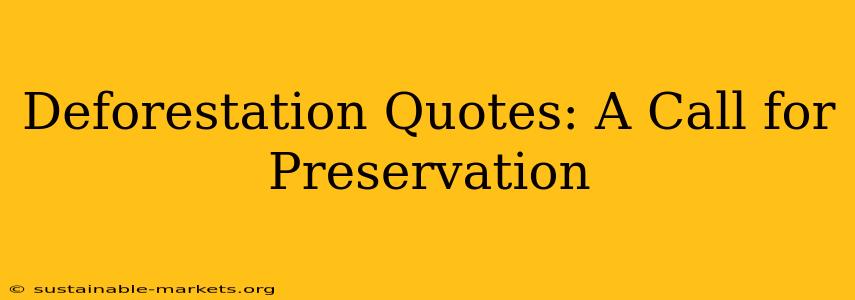Deforestation, the clearing of forests for other land uses, is a critical global issue with far-reaching consequences. From climate change to biodiversity loss, the impacts are devastating. Powerful quotes can encapsulate the urgency of the situation and inspire action. This article explores some impactful deforestation quotes and delves into the pressing need for forest preservation. We'll also address some common questions surrounding this vital topic.
The Impact of Deforestation: A Stark Reality
Before diving into the quotes, let's briefly understand the gravity of deforestation. The clearing of forests contributes significantly to greenhouse gas emissions, disrupting the delicate balance of our planet's climate. It leads to habitat loss, endangering countless plant and animal species, and reducing biodiversity. Furthermore, deforestation contributes to soil erosion, desertification, and water scarcity, impacting human livelihoods and global food security.
Powerful Quotes on Deforestation and its Consequences
Here are some compelling quotes that highlight the devastating effects of deforestation and the importance of conservation:
-
"The Earth provides enough to satisfy every man's needs but not every man's greed." – Mahatma Gandhi: This quote underscores the unsustainable consumption patterns driving deforestation. Our insatiable demand for resources often outweighs the planet's capacity to replenish them.
-
"We abuse land because we regard it as a commodity belonging to us. When we see land as a community to which we belong, we may begin to use it with love and respect." – Aldo Leopold: Leopold's words emphasize the shift in perspective needed – from viewing forests as exploitable resources to recognizing our interconnectedness with the natural world.
-
"The trees are the lungs of the earth, purifying the air and giving fresh strength to our people." – Franklin D. Roosevelt: This quote simply and effectively highlights the crucial role forests play in maintaining air quality and overall human well-being.
What are the main causes of deforestation?
Deforestation is driven by a complex interplay of factors. Major contributors include:
- Agriculture: Clearing land for farming, particularly large-scale monoculture agriculture, is a primary driver.
- Logging: The harvesting of timber for construction, paper production, and fuelwood contributes significantly.
- Mining: Extraction of minerals and fossil fuels often necessitates clearing vast areas of forest.
- Urbanization and Infrastructure Development: Expanding cities and building roads and other infrastructure encroach upon forested areas.
How can we prevent deforestation?
Combating deforestation requires a multifaceted approach involving governments, businesses, and individuals. Key strategies include:
- Sustainable Forestry Practices: Implementing responsible logging techniques that prioritize forest regeneration.
- Protecting Existing Forests: Establishing protected areas and national parks to safeguard biodiversity.
- Reforestation and Afforestation: Planting trees to restore deforested areas and create new forests.
- Promoting Sustainable Agriculture: Encouraging farming practices that minimize land use and environmental impact.
- Consumer Awareness: Educating consumers about the products that contribute to deforestation and promoting sustainable choices.
What are the environmental effects of deforestation?
The environmental consequences of deforestation are profound and far-reaching:
- Climate Change: Reduced carbon sequestration and increased greenhouse gas emissions.
- Biodiversity Loss: Habitat destruction leading to extinction and endangerment of species.
- Soil Erosion: Loss of topsoil and reduced soil fertility.
- Water Cycle Disruption: Changes in rainfall patterns and increased risk of floods and droughts.
What is the economic impact of deforestation?
While deforestation might initially seem to offer economic benefits through land clearing for agriculture or logging, the long-term economic consequences are often negative:
- Loss of Ecosystem Services: Reduced availability of clean water, fertile soil, and other resources.
- Reduced Agricultural Productivity: Soil degradation and desertification can lead to lower crop yields.
- Increased Costs of Disaster Management: Deforestation exacerbates the impact of natural disasters like floods and landslides.
Conclusion: A Collective Responsibility
The quotes presented above serve as stark reminders of the devastating consequences of deforestation. The responsibility for forest preservation rests on all of us – governments, businesses, and individuals. By adopting sustainable practices and promoting responsible consumption, we can protect our forests and ensure a healthy planet for future generations. The future of our forests, and indeed our planet, depends on our collective action.

